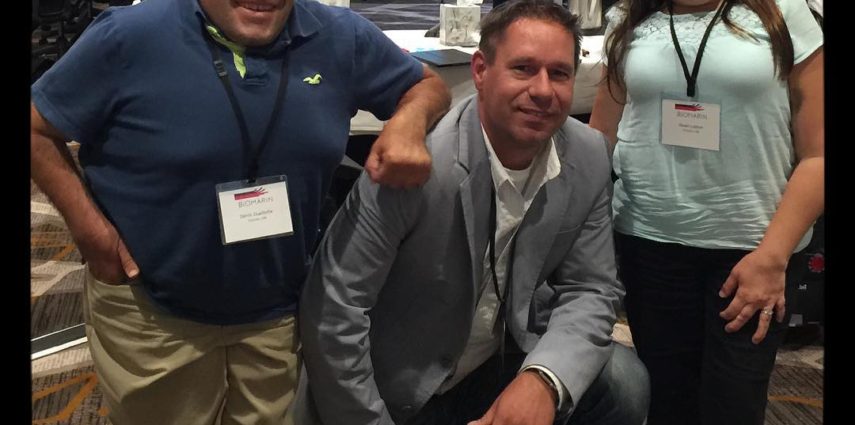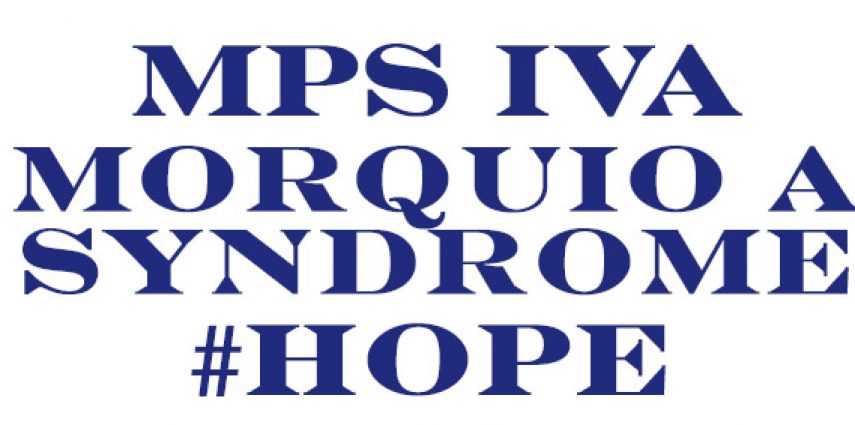Vimizim
An Open Letter to Brian Gallant and Victor Boudreau
When I last visited with Victor Boudreau, it was concerning a little girl (Kamie Babineau) who lives near Moncton that needed a life-saving treatment that is very similar to the treatment that Morgan needs. In fact, the only difference is the enzyme that each of these kids need. It’s simple really – unbelievably simple. Kids suffering from MPS lack an enzyme in their blood that breaks down cellular waste. The cellular waste that doesn’t get broken down needs to find a place to go so it stores itself in the bones, tissues, organs, and muscles of our kids fighting the disease.
The treatment our kids receive to help fight off the ravages of MPS is a synthetic version of the enzyme they are missing in the blood. Basically, our kids are missing this enzyme and we are giving it back to them. The enzyme treatment breaks down all of the cellular waste that is building up in the body and helps patients lead a more normal and healthier life.
It really is that simple, and it’s why Minister Boudreau approved access to the drug Kamie needed within days of receiving her application.
When we met at that time, Mr. Boudreau told me that one of the main reasons that he was so passionate about the work we are doing was because of a quote that tops my website, and a quote I work to live my life by. It’s a quote by Margaret Mead that read “Never doubt that a small group of thoughtful, committed citizens can change the world; indeed, it’s the only thing that ever has.”
Mr. Boudreau told me he saw this on my website and it struck a cord with him. He told me that Premier Gallant often uses this quote during cabinet meetings, telling his team that they have the opportunity to be that small group of committed citizens, and to always work to change the world in everything they do.
When he saw this on my website, Minister Boudreau told us that he went directly to the Premier with Kamie’s application for treatment and told him they needed to do something, and fast.
And it was fast – days. In a matter of days, Kamie’s application for treatment was approved. A short while later, she began her life-saving treatments and is thriving today. Thriving because the treatment works. Her life had been saved.
During that same meeting, I told Mr. Boudreau about Morgan Doucet. I told him there was another boy needing a very similar treatment and that he needed it fast. The treatment had been approved by Health Canada 8 months earlier and the Ministry of Health wouldn’t accept the physician’s application for reimbursement for Morgan. At that time, the Ministry said they “didn’t know what to do with the file.” Mr. Boudreau told me he would take the application and he would get back to me very quickly.
In reality, The Ministry of Health DID know what to do with Morgan’s file because they have been part of a larger collective in the country – a collective of all of the pharmaceutical managers throughout the country who made an agreement that they wouldn’t approve payment for the drug Morgan needed. Why? Cost. It’s an expensive drug and the Provinces wanted to work together to bring the cost of this treatment down. They discussed the drug together, made a commitment that “nobody would be the first to approve” and began work to bring the cost of the drug down.
In theory, brining the cost of pharmaceuticals down in this country is a good thing. I’m all for getting the best price on things, especially expensive things. But not at the expense of the people who have to suffer while the bureaucrats play hardball with the pharmaceutical industry.
I’ve had conversations with different provinces about this issue over the course of the past 2 years. They stand by their approach to this drug, even when told that it’s putting our kids in the middle of a battle that they want no part of, even when told that our kids are dying while they try to get the best deal possible for their respective Provinces.
Unfortunately for Minister Boudreau, he didn’t discover this until he took Morgan’s application and promised to get back to us quickly. Days turned into weeks, which turned into months. A battery of tests were ordered on Morgan and the Province worked to delay a decision on Morgan’s treatment by adding new tests after the original batches were complete.
When a decision on Morgans treatment was deemed “imminent”, the Ministry of Health ordered Morgan to undergo a sleep study, knowing full well that the New Brunswick didn’t have the capabilities to conduct such tests in the Province and that Morgan would have to fly to the Hospital for Sick Children in Toronto to have the tests done.
This is when I started to move from frustrated to upset. Why? Because the Ministry was well aware that the test Morgan required would take months to complete due to a wait list at Sick Kids in Toronto. Add to that the stress and burden placed on Morgan and his family by leaving their home, boarding an airplane, and finding their way around a huge city (something they have never done before).
But it wasn’t the delay which was incredulous to me, it was the test that was ordered with the clear intention of delaying things further for Morgan. They wanted a sleep study, even though Morgan has never had difficulty with his sleeping. Ever.
With some perseverance, we were able to remove the sleep study from the tests the Ministry ordered for Morgan. After that removal, the Province denied Morgan’s application. I immediately asked how we could appeal the ruling. I asked the Ministry, the Minister, and the Premier in multiple emails and phone calls. I was ignored each and every time.
Which brings us to where we are today. I relayed all of this to Minister Boudreau when we met yesterday and he told me he would take another look at Morgan’s file. He told me he would look at things after I told him the pharmaceutical managers have agreed to work together to deny access for our kids as they wage war on Big Pharma. He told me he would look into things after I told him the review process was flawed and set up to fail from the very beginning. He told me this after I told him that Saskatchewan saw through this flawed system and took it upon themselves to initiate their own proper, thorough, and transparent review. A review free of bias from Ministry officials. A review meant to provide REAL feedback.
During that meeting, however, I couldn’t help but wonder where the Minister’s gusto for being part of the small group of citizens working to change the world together went. If this wasn’t the time to step forward and take a stand, make a statement on behalf of a young child, then when? We know this treatment works. We know because we have 33 Canadian children receiving the treatment throughout the country. We know because the International and Canadian experts have all said it should be used in our kids as soon as possible.
And I know because I see it working each and every day, with every patient I visit, with every drop of drug that gets dripped into their body. Their lives are changed – saved – and we can see it in everything they do.
Saskatchewan took the lead and moved away from this review process. They did this because it is the right thing to do by patients.
So I again implore Victor Boudreau and Premier Brian Gallant to be part of that small group of citizens working to change the world. Take it upon yourselves to be the true leaders your Province needs you to be. I’m not asking for immediate access to treatment, just the commitment to a new, thorough, and transparent review of Morgan’s file. A review completed by the real experts out there, free of bias and bureaucratic interference.
Morgan deserves that opportunity, and it’s incumbent on your offices to be sure that he gets that chance. Please be part of the change you purport to stand for and don’t hide behind the excuses being handed to you by the bureaucrats. The government has nothing to lose by ordering a new review, but Morgan has EVERYTHING to lose if they don’t.
This shouldn’t be about cost, about the Provinces of Canada vs. Big Pharma. It should be about Morgan, and I ask you humbly to refocus things on that little boy. In the end, it WILL change his world.
I stand by my offer to bring in Dr. Paul Harmatz to talk with you about this disease, this treatment, and this case. He’s the best in the world when it comes to this disease. If your government is open, transparent, and about the change you want to see in this world, a good first step toward showing this would be to talk with Dr. Harmatz and get the real information you need.
I’ll be in Fredericton this week and hope we can discuss while I’m there.
Baie Sainte Anne Boy Needs Drug To Manage Rare Disease
A young Baie Sainte Anne boy’s plight made it to the floor of the provincial legislature this morning.
Morgan Doucet, 10, is currently the only person in New Brunswick suffering from morquio syndrome.
On Wednesday morning, Southwest Miramichi-Bay du Vin MLA Jake Stewart called on the province reverse its decision not to fund a Health Canada approved treatment for Doucet’s illness.
According to the U.S. National Library of Medicine, morquio syndrome is an inherited disease of metabolism in which the body is missing or doesn’t have enough of a substance needed to break down long chains of sugar molecules called glycosaminoglycans (formerly called mucopolysaccharides).
Symptoms include:
– Abnormal development of bones, including the spine
– Bell-shaped chest with ribs flared out at the bottom
– Coarse facial features
– Hypermobile joints
– Knock-knees
– Large head (macrocephaly)
-Short stature with a particularly short trunk
– Widely spaced teeth
While Stewart didn’t name the treatment in question, the only Health Canada approved drug for the disease is Vimizim, which was approved last year.
Annual treatment can cost upwards of $100,000.
Stewart said Doucet needs treatment.
“Recently access to this lifesaving medication for Morgan Doucet was denied by the minister of health and the department, even though it is the gold standard of care as recommended by the international treatment guidelines, has been recommended by the Canadian Expert Panel on Morquio Syndrome and has been prescribed by Morgan’s genetic specialist at the IWK ” Stewart said in the legislature.
He accused the government of overruling the experts and said there is no process for appeal.
Health Minister Victor Boudreau said he could not discuss the specifics of the case on the floor of the legislature, citing privacy rules, but said their is a process in place for situations like Doucet’s.
“Because we do not have the level of expertise on these rare diseases and rare drugs here in the province of New Brunswick we rely on the province of Ontario and this is a process that was put in place by the member for Rothesay, the former minister,” Boudreau said.
He explained that the file is sent to experts in Ontario and they get back to the New Brunswick government with a recommendation.
But Stewart wasn’t happy with that reply.
“The drug that Morgan requires is currently being funded by Saskatchewan, Ontario and Quebec and in most developed countries. Morgan’s application was denied by a single reviewer from Ontario, a reviewer who no longer practices medicine and has never used this treatment,” Stewart said.
He also said Saskatchewan found flaws with the review process and with that reviewer. He said that province now deals directly with the experts on specific diseases.
“I ask the minister of health and the premier, will they show the same leadership and do the right thing by ordering a new review of Morgan’s file and provide immediate access to this life saving treatment while that review is taking place?” Stewart asked.
Boudreau said these are very tough situations.
“Everybody in this legislature has a heart and understands that these decisions are difficult to make,” Boudreau said.
“I can tell you that across the country, and in New Brunswick, some cases get approved, some cases don’t. We follow a process, Mr. Speaker. I am not an expert, and we don’t even have those experts within our department or within our province,” he added, saying the process was followed.
‘It’s a life-changing decision’: Saskatoon kids to get enzyme treatment after all
BY JONATHAN CHARLTON, THE STARPHOENIX
When Muhammed Akhter got the phone call saying his three sick children would be getting their critical treatment after all, he had to ask the ministry representative three times be certain.
“It’s a life-changing decision,” he said.
After an external review, the provincial government has decided to cover the cost of Vimizim, an expensive enzyme replacement therapy used to treat the rare Morquio syndrome. This reverses the health ministry’s previous decision not to pay for the drug, which can cost up to $460,000 per year.
The information that went through the initial Common Drug Review process was “fairly limited” in terms of whether Vimizim was effective, Health Minister Dustin Duncan said.
“I’m comfortable with going to essentially a second opinion for myself and having outside experts weigh in and say there is, perhaps, some benefit for these particular patients based on their current conditions.”
Health ministers across the country are facing similar decisions due to different medical opinions, he said.
“In a lot of cases, tretments are changing perhaps more quickly than drug plans and provinces can keep up with them, but as well the medical community.”
The funding is for one year of treatment, after which the children will be examined to see how well it’s working.
The Akhter children, who are eight, 10 and 12 years old, all began showing symptoms around age four or five. They all have vision and hearing loss, weak bones and joints, and stunted growth.
Akhter is hopeful – in most cases Vimizim works, with some children even ridding themselves of their wheelchairs, he said.
“The patients who are taking that medicine, they are getting really better.”
Andrew McFadyen, executive director of advocacy group The Isaac Foundation, praised the decision.
“We’re elated, this is incredible news. At the same time, though, it really just brings us in line with what the expert opinion says.”
Difficulties exist not just in Saskatchewan but across the country when it comes to treatments for rare diseases, he said.
In fact, he’s headed to New Brunswick where another patient has been denied coverage for Vimizim.
“I’m hopeful the news out of Saskatchewan will prompt minters and ministries to take a step back and put in (place) a fair review system that gives access to these patients when they need it most.”
Twitter.com/J_Charlton
'It's a life-changing decision': Saskatoon kids to get enzyme treatment after all
BY JONATHAN CHARLTON, THE STARPHOENIX
When Muhammed Akhter got the phone call saying his three sick children would be getting their critical treatment after all, he had to ask the ministry representative three times be certain.
“It’s a life-changing decision,” he said.
After an external review, the provincial government has decided to cover the cost of Vimizim, an expensive enzyme replacement therapy used to treat the rare Morquio syndrome. This reverses the health ministry’s previous decision not to pay for the drug, which can cost up to $460,000 per year.
The information that went through the initial Common Drug Review process was “fairly limited” in terms of whether Vimizim was effective, Health Minister Dustin Duncan said.
“I’m comfortable with going to essentially a second opinion for myself and having outside experts weigh in and say there is, perhaps, some benefit for these particular patients based on their current conditions.”
Health ministers across the country are facing similar decisions due to different medical opinions, he said.
“In a lot of cases, tretments are changing perhaps more quickly than drug plans and provinces can keep up with them, but as well the medical community.”
The funding is for one year of treatment, after which the children will be examined to see how well it’s working.
The Akhter children, who are eight, 10 and 12 years old, all began showing symptoms around age four or five. They all have vision and hearing loss, weak bones and joints, and stunted growth.
Akhter is hopeful – in most cases Vimizim works, with some children even ridding themselves of their wheelchairs, he said.
“The patients who are taking that medicine, they are getting really better.”
Andrew McFadyen, executive director of advocacy group The Isaac Foundation, praised the decision.
“We’re elated, this is incredible news. At the same time, though, it really just brings us in line with what the expert opinion says.”
Difficulties exist not just in Saskatchewan but across the country when it comes to treatments for rare diseases, he said.
In fact, he’s headed to New Brunswick where another patient has been denied coverage for Vimizim.
“I’m hopeful the news out of Saskatchewan will prompt minters and ministries to take a step back and put in (place) a fair review system that gives access to these patients when they need it most.”
Twitter.com/J_Charlton
LIFE-SAVING TREATMENT APPROVED FOR SASKATOON SIBLINGS
Ministry of Health Reverses Funding Decision; Family Elated That “Hope Has Returned”
FOR IMMEDIATE RELEASE: The Minister of Health in Saskatchewan has approved funding for a life-saving treatment required by three siblings from Saskatoon. 8 year-old Sara Amir, along with her siblings Khadija, 10 and Muhammad, 12, suffer from MPS IVA (Morquio Syndrome) and require the life-saving treatment immediately in order to halt further progression of their devastating disease. After initially denying funding for the children, the Minister of Health ordered a review of the files and asked a panel of experts to provide feedback to the Ministry regarding the children and the treatment required.
Sufferers of Morquio Syndrome lack an enzyme in their blood that breaks down cellular waste in the body. This waste builds up in the bones, tissues, organs, and muscles of affected individuals and lead to many devastating symptoms including heart and airway disease, corneal clouding, stiffening of the joints, shortened stature, and premature death.
Andrew McFadyen, Executive Director of The Isaac Foundation, an advocacy, research, and family support organization that specializes in MPS related diseases, was thrilled with the news. “I applaud the Minister for his leadership during this review, and thank him for the open and transparent way with which he conducted this review. This is life-saving for these children, and life-changing for their family. This is incredible news.”
Jamie Myrah, Executive Director of The Canadian MPS Society, also thanked the NDP Health Critic, Danielle Chartier, for her work bringing this issue to the legislature and for the advocacy she provided the family during what was a very emotional period.
McFadyen adds, “The Saskatchewan government has taken a leadership role on this and have come in line with the Canadian Expert Opinion and the International Treatment Guidelines for Morquio Syndrome. They have also mirrored the recent recommendations from the UK. Most importantly, they’ve given hope back to this family – hope for a new life and the chance at fighting back against this relentless disease. For that, I am incredibly thankful to Minister Duncan and his team.”
# # #
For more information about this topic, or to schedule an interview with Andrew McFadyen, please call Andrew at 613-328-9136 or email Andrew at mcfadyena@me.com. The Isaac Foundation can also arrange interviews with parents of patients currently receiving this treatment in Canada.
Backgrounder
While not a cure for Morquio Syndrome, the necessary Enzyme-Replacement Therapy (ERT) is designed to provide patients with a synthetic version of the enzyme they are lacking by infusing small doses into the patient’s bloodstream on a weekly basis. The treatment slows down or halts the progression of the disease in patients, improves endurance, walking distance, breathing problems, and provides other benefits to sufferers that dramatically improve their quality and length of life. International experts and a Canadian Panel of Genetics Specialists have all recommended Vimizim as the front-line treatment for Morquio Syndrome. It was approved by Health Canada in July 2014, and has been reimbursed for use by patients in Saskatchewan, Ontario, and Quebec. Recently, the National Institute for Health and Care Excellence (NICE) recommended reimbursement for all 88 patients suffering from Morquio Syndrome throughout the UK.
FDA Approves Vimizim for Treatment of MPS IVA
 FDA NEWS RELEASE
FDA NEWS RELEASE
For Immediate Release: Feb. 14, 2014
Media Inquiries: Andrea Fischer, 301-796-0393, andrea.fischer@fda.hhs.gov
Consumer Inquiries: 888-INFO-FDA
FDA approves Vimizim to treat rare congenital enzyme disorder
First drug to receive Rare Pediatric Disease Priority Review Voucher
The U.S. Food and Drug Administration today approved Vimizim (elosulfase alfa), the first FDA-approved treatment for Mucopolysaccharidosis Type IVA (Morquio A syndrome). Morquio A syndrome is a rare, autosomal recessive lysosomal storage disease caused by a deficiency in N-acetylgalactosamine-6-sulfate sulfatase (GALNS). Vimizim is intended to replace the missing GALNS enzyme involved in an important metabolic pathway. Absence of this enzyme leads to problems with bone development, growth and mobility. There are approximately 800 patients with Morquio A syndrome in the United States.
Vimizim was granted priority review. An FDA priority review provides for an expedited review of drugs for serious diseases or conditions that may offer major advances in treatment. Vimizim is also the first drug to receive the Rare Pediatric Disease Priority Review Voucher – a provision that aims to encourage development of new drugs and biologics for the prevention and treatment of rare pediatric diseases.
“This approval and rare pediatric disease priority review voucher underscores the agency’s commitment to making treatments available to patients with rare diseases,” said Andrew E. Mulberg, M.D., deputy director, Division of Gastroenterology and Inborn Errors Products in the FDA’s Center for Drug Evaluation and Research (CDER). “Prior to today’s approval, patients with this rare disease have had no approved drug treatment options.”
The safety and effectiveness of Vimizim were established in a clinical trial involving 176 participants with Morquio A syndrome, ranging in age from 5 to 57 years. Participants treated with Vimizim showed greater improvement in a 6-minute walk test than participants treated with placebo. On average, patients treated with Vimizim in the trial walked 22.5 meters farther in 6 minutes compared to the patients who received placebo.
The most common side effects in patients treated with Vimizim during clinical trials included fever, vomiting, headache, nausea, abdominal pain, chills and fatigue. The safety and effectiveness of Vimizim have not been established in pediatric patients less than 5 years of age. Vimizim is being approved with a boxed warning to include the risk of anaphylaxis. During clinical trials, life-threatening anaphylactic reactions occurred in some patients during Vimizim infusions.
Vimizim is marketed by Novato, Calif.-based BioMarin Pharmaceutical Inc.
For more information:
- FDA Approved Drugs: Questions and Answers
- Rare Pediatric Disease Priority Review Voucher Program
- National Institutes of Health: Mucopolysaccharidosis Type IVA (Morquio A disease)
The FDA, an agency within the U.S. Department of Health and Human Services, protects the public health by assuring the safety, effectiveness, and security of human and veterinary drugs, vaccines and other biological products for human use, and medical devices. The agency also is responsible for the safety and security of our nation’s food supply, cosmetics, dietary supplements, products that give off electronic radiation, and for regulating tobacco products.
#
Morquio A Syndrome (MPS IVA) Advocacy
I’m excited to announce that The Isaac Foundation will be working with families throughout Canada to help ensure provincial funding for Enzyme Replacement Therapy (ERT) for MPS IVA patients is forthcoming once the treatment gets approval from Health Canada.
Morquio Syndrome is a rare disease that is part of the MPS umbrella of lysosomal storage disorders. The disease affects major organ systems in the body and leads to devastating symptoms for sufferers. These symptoms included bone and joint disease, heart and airway disease, a shortened stature, and premature death.
We have been fortunate to have had success advocating for families seeking support and treatment options for other forms of MPS in numerous provinces over the past 8 years. Currently, there are no treatment options for sufferers of MPS IVA. However, recent clinical trials for Biomarin’s Vimizim have produced very promising results, and Health Canada is expected to approve the treatment for use in Canada in the very near future – most likely before the summer of 2014. A decision by the FDA in the United States is imminent, and an approval in the US could mean that patients can access the treatment via the Federal Government’s Special Access Program. However, approval through the SAP is always contingent on provincial funding being made available.
We are excited to help advocate with families as they seek treatment options for themselves or their affected children, and will work with the same passion and resolve that we have given all of our other advocacy efforts.
If you or your family is interested in working with The Isaac Foundation to help bring ERT to your province for yourself or your children, please don’t hesitate to contact Andrew McFadyen at HERE or via telephone at 613.328.9136.
For more information about Morquio A Syndrome please click HERE.






